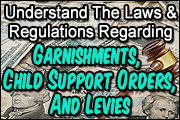Training For Texas Garnishment Law Requirements
Texas Garnishment Law Requirements
 What Is A Garnishment?
What Is A Garnishment?A wage garnishment is any legal or equitable procedure through which some portion of a person's earnings is required to be withheld by an employer for the payment of a debt.
The six basic types of garnishments are child support, federal, state, or local levies, creditor garnishments, and student loans, with the largest amount of garnishments being for child support.
Texas Wage Garnishment Rules
In Texas, wage garnishments are commonly referred to as "wage attachments". Wage attachments are orders from courts or state agencies that direct an employer to withhold a specific amount from an employee's wages, then disburse those funds to the named creditor.
Though most states allow garnishments for bankruptcies, consumer debt, and other reasons, Texas only allow garnishments from/for the following entities or reasons:
- Unpaid child support
- Alimony
- Federal and state government for unpaid taxes, fines, and penalties
- Unpaid student loans that have been declared in default
About Child Support Garnishments
With regard to child support garnishments, all states are required to use the "Order/Notice To Withhold Income For Child Support" notice for Child Support. This notice is designed to provide employers with key information so that they do not have to decipher unfamiliar orders/notices from different states. Click
here for details on this notice, and see below for suggested steps to process this notice.
Steps To Process The Income-Withholding Order/NoticeUpon receipt of the Order/Notice to Withhold Income for Child Support, the employer should:
- Document the date of receipt
- Determine if the order is "regular on its face" (that is, it appears to be an authentic and complete legal document)
- Provide a copy of the Order/Notice to the employee if it has been issued by another state, and
- Follow the terms of the order
Employers should also note that they cannot contest the income-withholding order; however, the employer should contact the issuing agency if unable to implement the withholding either because the individual named in the order is not an employee or a withholding is already in place for the child and employee. Additionally, employers should note that states often have varying garnishment rules, so they should be sure to know the payroll wage garnishments rules for the state(s) in which it does business.
Employer Guidelines For Handling Texas Wage Attachments
Employers generally have to notify the debtor in writing that a wage garnishment is about to start before making a garnishment and sending payments to the creditor. The wage garnishment then typically continues until the debts are paid off or otherwise resolved. Employers are required to provide employees with a copy of garnishment paperwork.
Note: Texas law allows state agencies to deduct an administrative fee from the employee's disposable earnings each month; this is in addition to the amount required to be withheld under the withholding order. Texas employers should also note that debts incurred in other states may not be protected from wage garnishment by Texas law.
Recommended Garnishment Training Courses:
Find Seminars, Webinars, And Online Training In Your Area
References and Disclaimers
This information is based on a variety of state laws and regulations, and is subject to change. The PayrollTrainingCenter makes every effort to make sure this information is current and accurate, however, the PayrollTrainingCenter is not engaged in rendering legal or professional advice and shall not be held responsible for any inaccuracies contained herein.
https://www.garnishmentlaws.org/texas-garnishment-laws
https://fmx.cpa.texas.gov/fm/pubs/paypol/mandatory_deductions/index.php?section=wage_garnish&page=wage_garnish


 What Is A Garnishment?
What Is A Garnishment?



